How Much Is a Hunting License?

In the vast majority of cases, you will need to purchase a hunting license to hunt in any state in the U.S. Besides meeting the licensing requirements, hunters will also need to pay a fee. So how much is a hunting license? The short answer is "it varies." Read on to learn about the general cost and how to find specifics for each state.
Recommended: How to Get a Hunting License
Common Categories of Hunting Licensing Fees at a Glance:
- General hunting licenses
- Big game permits
- Specific animal permits
- Length of hunt
- Private land permits
- Trapper’s permits
- Non-residence permits
- Special licenses
Why Are There Hunting Fees?
You might be wondering why you need to pay a hunting fee at all. Understanding why hunting licensing fees exist help in understanding their importance. Essentially, hunting fees help to enforce hunting regulations, and hunting regulations are in place to support conservation efforts, ensure wildlife thrive and to keep hunters safe.
Common Categories of Hunting Licensing Fees
Most states break hunting licensing requirements and fees into a number of categories. You can learn more about your state’s specific hunting licensing requirements and fees at ReserveAmerica’s Fishing & Hunting License webpage. Simply choose the state where you will be hunting from the drop down and click on the link.
As a general overview, below are some of the types of fees you may have to pay to hunt legally:
General Hunting Licenses
A general hunting license allows you to hunt during the hunting season, typically for animals that are not considered big game. This might include squirrels, rabbits and game birds. Sometimes fishing licenses can be combined with a hunting license for an additional nominal fee.
Big Game Permits
Many states have a separate license to hunt big game. Each state has its own definition of big game, which often includes deer, elk and bears.
Specific Animal Permits
Some states require a specific permit to hunt a certain animal. For example, Minnesota has a number of separate hunting licenses, including for bear, moose and turkey.
Length of Hunt
Hunting permits may be granted for a single day, a number of days, or a whole season. The longer the period of time, the greater the cost of the permit.
Recommended: The Benefits of Hunting in California
Private Land Permits
In some states, you will need a specific license to hunt on private land. These may be further divided into other categories. In some states, standard hunts are differentiated from quality hunts. Quality hunts are designed to increase the hunter’s success rate.
Trapper’s Permits
Most states have a specific fee for a trapper’s license. Some states will not offer trappers licenses to certain classes of non-residents.
Non-Residence Permits
All of the varying categories of hunting licenses are further divided based on whether you are a state resident or a non-resident. The same goes for hunting in Canada.
Special Licenses
Most states offer at least a couple types of specialized licenses, often at discounted prices. Senior hunting licenses are extremely common, and some states even have lifetime hunting licenses that are a great cost-saver for long-time avid hunters. While some states have a couple specialized permits, others states like New Jersey, offer a wide array of special licenses for:
- Youth
- Farmers
- Active duty military
- Apprentice hunters
- National Guard
- Disabled veterans
Other Related Fees
Besides paying the appropriate hunting licensing fee, there may be other costs associated with getting that license. Many states require that hunters take a safety course as part of qualifying for their permit. In some states, these courses are free. In other states, these courses run about $15.
Additionally, you will need a valid form of identification to purchase a hunting license. Identification will also be required to prove that you meet in-state resident requirements or other requirements for special licenses. Consider the costs of such identification if you do not already have one.
Take the next step! Find your individual State’s information here!